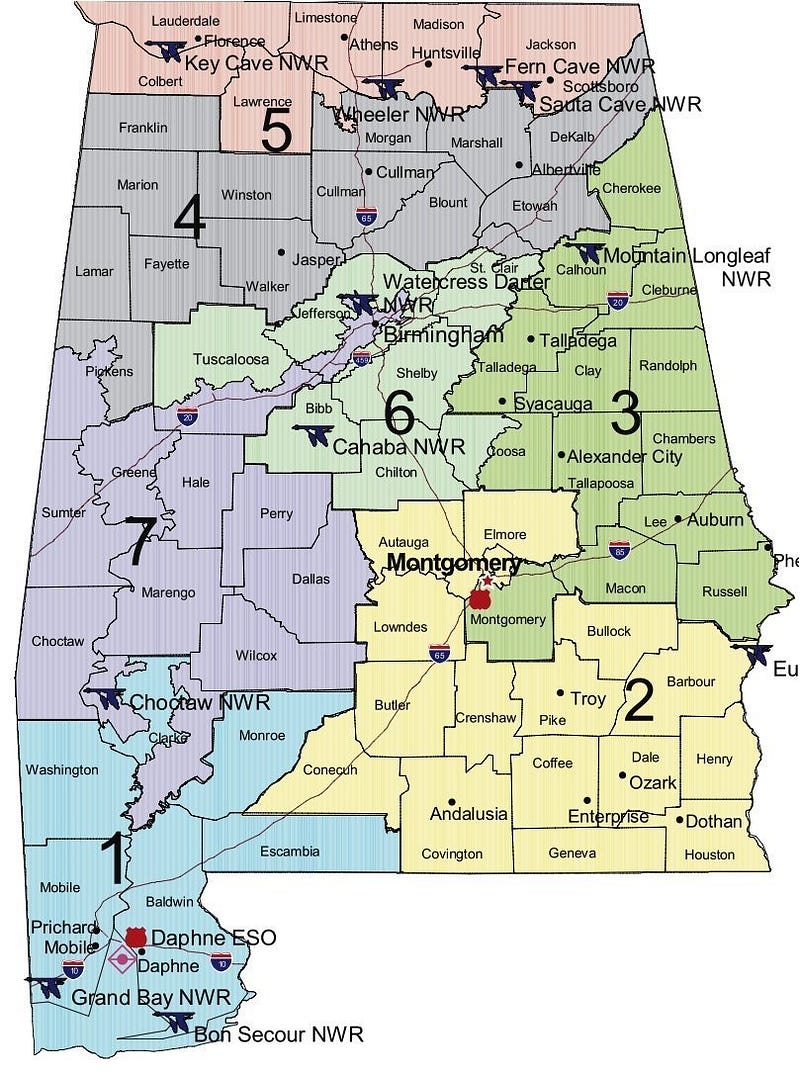By: M Baqir Mohie El-Deen, MPAC Policy Program Manager
Earlier this month, the Supreme Court reinstated a voting map which effectively deprives Alabama’s African American community of adequate congressional representation. The lower courts previously concluded that the voting map disenfranchised African Americans by connecting the majority African American parts of Birmingham, Montgomery, and Tuscaloosa with the African American-majority counties in the southwest of the state. As a result of the Supreme Court’s decision, Alabamians will head to the midterms with a voting map in clear violation of the Voting Rights Act of 1964. As an additional consequence of the Supreme Court’s decision, Alabama Republicans will likely retain a seat in Congress they would have otherwise lost.

African Americans constitute 30% of Alabama’s voters, but they will likely have only 14% of their state’s representation in Congress — one of seven congressional seats. Redrawn voting maps would have been more equitable; they would have guaranteed African Americans congressional representation in proportion with their share of the voting population. In the other six districts, Republican candidates enjoy margins of victory that range from 32% to 65%, which would effectively nullify the vote of African Americans who overwhelmingly trend to support Democratic candidates in Alabama.
Why is this wrong?
The Voting Rights Act of 1964 specifically protects against this scenario from occurring. It is illegal that a voting map signals to a particular race that their vote doesn’t matter, and they are better off staying home on election day. The lower courts understand this argument. It was the driving force behind their decision to rule against Alabama’s voting map. The three-judge panel applied Hornbook Law to the voting map, a law that is considered to be a basic legal principle — so well-established and accepted by the courts and the public that it does not require any further explanation or clarification. The precedent in this scenario has existed as common law for more than 35 years.
What happened in the Supreme Court?
The Supreme Court ruled against the lower court’s decision with the support of five justices, with Chief Justice John Roberts dissenting against the court’s conservative wing. The Supreme Court’s brief order was provisional and it will allow this case to move forward in the Supreme Court, but not now, permitting the challenged voting map that the lower courts ruled were in violation of the Voting Rights Act of 1964 to be used in the upcoming midterm elections.
In a concurring opinion, Justice Brett Kavanaugh, together with Justice Samuel Alito, wrote
“the stay order does not make or signal any change to voting rights law. When an election is close at hand, the rules of the road must be clear and settled. Late judicial tinkering with election laws can lead to disruption and to unanticipated and unfair consequences for candidates, political parties and voters, among others.”
Alabama’s primaries were more than 100 days away when the Supreme Court issued this ruling. In the past, the Supreme Court has forced states to redraw voting maps with elections fewer than a 100 days away. With the technological advancements that have occurred over the past few decades, the lower courts were correct that Alabama had ample time to redraw their voting maps without violating the Voting Rights Act of 1964.
Why is Chief Justice Roberts’ Dissent Significant?
Historically, Chief Justice Roberts has not been a supporter of reviewing gerrymandering districts. Famously, and recently, he wrote the Rucho v. Common Cause decision that stated there’s no such thing as partisan gerrymandering. However, in this case, even Chief Justice Roberts saw that the proposed districts in Alabama were intended to disenfranchise African American Voters.
In his dissent Chief Justice Roberts stated that the lower court in the Alabama case had
“properly applied existing law in an extensive opinion with no apparent errors for our correction.”
Furthermore, he stated that the Supreme Court’s precedents
“have engendered considerable disagreement and uncertainty regarding the nature and contours of a vote dilution claim.”
According to Chief Justice Roberts, the correct solution should have been to agree to hear the state’s appeal — but not to grant the current voting map to stay valid in this upcoming election.
“The practical effect of this approach would be that the 2022 election would take place in accord with the judgment of the district court, but subsequent elections would be governed by this court’s decision on review.”
What does this mean moving forward?
Through their decision to use a voting map that an independent three-judge panel has determined to be racist after hearing a week’s worth of testimony, the Supreme Court is ensuring that Republicans retain a congressional seat in the upcoming midterm elections. The upcoming 2022 midterm election has a lot at stake for both parties. The results of this election will determine the next two years of the Biden Administration’s ability to enact change before the 2024 Presidential election. The results of the U.S. House of Representatives election is expected to be very close, and the Supreme Court has signaled that it is willing to take political stances to ensure that Republicans won’t lose seats in the upcoming elections at any cost. In Alabama’s case, redrawn voting maps would probably result in Republicans losing one seat to Democrats.
There are currently 11 states with proposed voting maps in litigation, and some may reach the Supreme Court over the next few weeks. In a functioning democracy, and in the America that our founders envisioned, the highest courts of the land should be apolitical. If our Supreme Court continues with this dangerous precedent of ruling on gerrymandering cases for political gain, it may delegitimize the court’s authority to a large faction of the population, setting the United States down a tumultuous and uncharted path. We will see where it leads.
Invest in MPAC’s work to improve public policies and perceptions. We’re changing how America views Islam and Muslims.